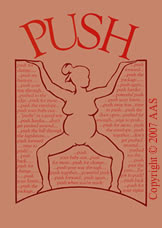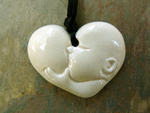 Research in peer reviewed obstetric literature shows that epidural anesthesia is strongly associated with abnormal fetal position (occiput posterior) at delivery and may help explain the high rates of operative delivery observed after administration of an epidural. (Obstetrics & Gynecology 2005; 105: 974-82).
Research in peer reviewed obstetric literature shows that epidural anesthesia is strongly associated with abnormal fetal position (occiput posterior) at delivery and may help explain the high rates of operative delivery observed after administration of an epidural. (Obstetrics & Gynecology 2005; 105: 974-82).Baby Jasmyn was induced by nurse midwives in a military hospial, and as you can see by her photo, she was very mispositioned and terribly stuck. Increased pitocin "to get that baby out" resulted in extremely violent and terrifying labor for her and her mother before Jasmyn was born by emergency cesarean. Her mother knew something was wrong and wanted a cesarean. The resident and attending argured about this for over an hour while the mother (and Jasmyn) was on oxygen. Jasmyn and mother met for first time thirteen hours later. Many babies are not these bruised but medical staff did not even acknowledge the bruising. "Hear no evil, see no evil, speak no evil." Families are too vulnerable, too shocked, too disempowered to confront the system.
A subset of questions:
1) Did medical people proceed with induction not knowing or inspite of the baby not being in proper position for birth, knowing that induced contractions never relent so baby can't ever align? Or, is it as the Journal of Obstetrics and Gynecology reports? And, in every one of these cases, why are medical caregivers still allowed to do non-medically necessary inductions when science tells us it is the baby who hormonally sends message to mother that starts labor?
2) Is pitocin chemically identical to oxytocin? And, is it safe for inducing a baby's birth? Is the use of synthetic or non-chemically identical oxytocin safe for the baby? Michel Odent, MD (www.wombecology.com) and Peter Nathanielsz, PhD, MD (Life in the Womb: Origin of Health and Disease) have extraordinary work on the importance of hormones and pituitary set points established in utero and during birth.
3) Was this a medically induced surgery? Why isn't this subject to malpractice, given their own research? Jasmyn's mother demanded the cesarean surgery. Was this a maternal-choice surgery based on "informed consent" and "best practice"?
4) Obviously Jasmyn's birth is a "good outcome" as she was born alive and survived the first year of life. But, does this birth really have no affect on her -- because she doesn't, so society says, REMEMBER it? A newborn baby's brain has a billion neurons ready to wire up. Was her brain not fully functioning so that she does in fact remember, in the cells of her preverbal part of the brain - her Limbic system? Does she have any emotional or psychological dynamics from her birth? From a thirteen hour separation from her mother? Please visit the Asoociation for Pre and Perinatal Psychology and Health website at www.BirthPsychology.com and my site, www.ItstheBabiesBirth.com. How could medical people and society believe that these forces of drugs and interventions during birth aren't important to treat? Or recognize that this is also a symptom of likely brain trauma? And, so school aged children with aggression, fears, and inability to follow through on school tasks are never viewed as being so because of early brain injury at birth.
I ask you to join me in honoring Jasmyn and her birth and her family's generous sharing of her photo and story for my own work. In my work in supporting the healing of trauma from birth, it is crucial to honor the baby who endured what she did -- for in the pain and shadow, are her gifts. Jasmyn is an amazing girl, now six. She is strong-willed, tenacious, and beautiful little girl. I love this little girl and I admire her courage and strength, her story and journey, and what she has taught me and what she brings to this work.
I dedicate this blog to Jasmyn, my babies, Andy, Erin, Joe, and Mariah, and to all of the babies who didn't have, but deserved an aware, safe, and gentle journey to this world.








2 comments:
"Jasmyn..She is strong-willed, tenacious"
I wonder about this personality characteristic. My 9 yo son who experienced a traumatic birth and 2 weeks on a ventilator is also very strong willed and tenacious. I wonder if that personality characteristic helped him to survive his ordeal, or if his ordeal actually caused or magnified that personality trait.
That is a good research question, Mama Liberty.
Either way, it's about honoring the baby's experience as his or her way of viewing and experiencing the world.
Drs. Emerson, Castellino and others are making progress at understanding the dynamics of birth.
Post a Comment